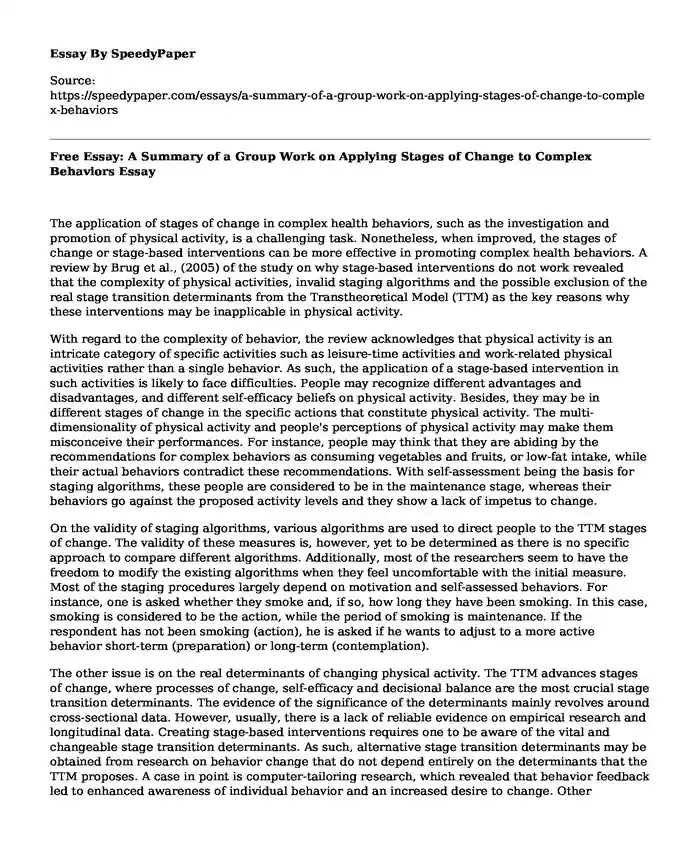
| Type of paper: | Essay |
| Categories: | Healthcare Consciousness Behavior change |
| Pages: | 3 |
| Wordcount: | 593 words |
The application of stages of change in complex health behaviors, such as the investigation and promotion of physical activity, is a challenging task. Nonetheless, when improved, the stages of change or stage-based interventions can be more effective in promoting complex health behaviors. A review by Brug et al., (2005) of the study on why stage-based interventions do not work revealed that the complexity of physical activities, invalid staging algorithms and the possible exclusion of the real stage transition determinants from the Transtheoretical Model (TTM) as the key reasons why these interventions may be inapplicable in physical activity.
With regard to the complexity of behavior, the review acknowledges that physical activity is an intricate category of specific activities such as leisure-time activities and work-related physical activities rather than a single behavior. As such, the application of a stage-based intervention in such activities is likely to face difficulties. People may recognize different advantages and disadvantages, and different self-efficacy beliefs on physical activity. Besides, they may be in different stages of change in the specific actions that constitute physical activity. The multi-dimensionality of physical activity and people's perceptions of physical activity may make them misconceive their performances. For instance, people may think that they are abiding by the recommendations for complex behaviors as consuming vegetables and fruits, or low-fat intake, while their actual behaviors contradict these recommendations. With self-assessment being the basis for staging algorithms, these people are considered to be in the maintenance stage, whereas their behaviors go against the proposed activity levels and they show a lack of impetus to change.
On the validity of staging algorithms, various algorithms are used to direct people to the TTM stages of change. The validity of these measures is, however, yet to be determined as there is no specific approach to compare different algorithms. Additionally, most of the researchers seem to have the freedom to modify the existing algorithms when they feel uncomfortable with the initial measure. Most of the staging procedures largely depend on motivation and self-assessed behaviors. For instance, one is asked whether they smoke and, if so, how long they have been smoking. In this case, smoking is considered to be the action, while the period of smoking is maintenance. If the respondent has not been smoking (action), he is asked if he wants to adjust to a more active behavior short-term (preparation) or long-term (contemplation).
The other issue is on the real determinants of changing physical activity. The TTM advances stages of change, where processes of change, self-efficacy and decisional balance are the most crucial stage transition determinants. The evidence of the significance of the determinants mainly revolves around cross-sectional data. However, usually, there is a lack of reliable evidence on empirical research and longitudinal data. Creating stage-based interventions requires one to be aware of the vital and changeable stage transition determinants. As such, alternative stage transition determinants may be obtained from research on behavior change that do not depend entirely on the determinants that the TTM proposes. A case in point is computer-tailoring research, which revealed that behavior feedback led to enhanced awareness of individual behavior and an increased desire to change. Other researches such as the implementation intention study reveal that developing specific action programs may assist individuals in focusing their motivation on health-promoting activities.
References
Brug, J., Conner, M., Harre, N., Kremers, S., McKellar, S., & Whitelaw, S. (2005). The Transtheoretical Model and Stages of change: a critique: observations by five commentators on the paper by Adams, J. and White, M.(2004) why don't stage-based activity promotion interventions work? Health education research, 20(2), 244-258.
Cite this page
Free Essay: A Summary of a Group Work on Applying Stages of Change to Complex Behaviors. (2023, Apr 23). Retrieved from https://speedypaper.com/essays/a-summary-of-a-group-work-on-applying-stages-of-change-to-complex-behaviors
Request Removal
If you are the original author of this essay and no longer wish to have it published on the SpeedyPaper website, please click below to request its removal:
- Education Essay Sample: Value of Higher Education
- Essay Example on American Medical News
- Discussion Essay Sample on the Clinton Foundation
- Free Essay: Environmental Problems in the African Continent and Ways to Address the Problems
- Essay Sample: August Wilson Life and Work and Frida Kahlo Life and Paintings
- Essay Sample on Product Offering
- Essay Sample on Stress and the Mental Health of Children
Popular categories




